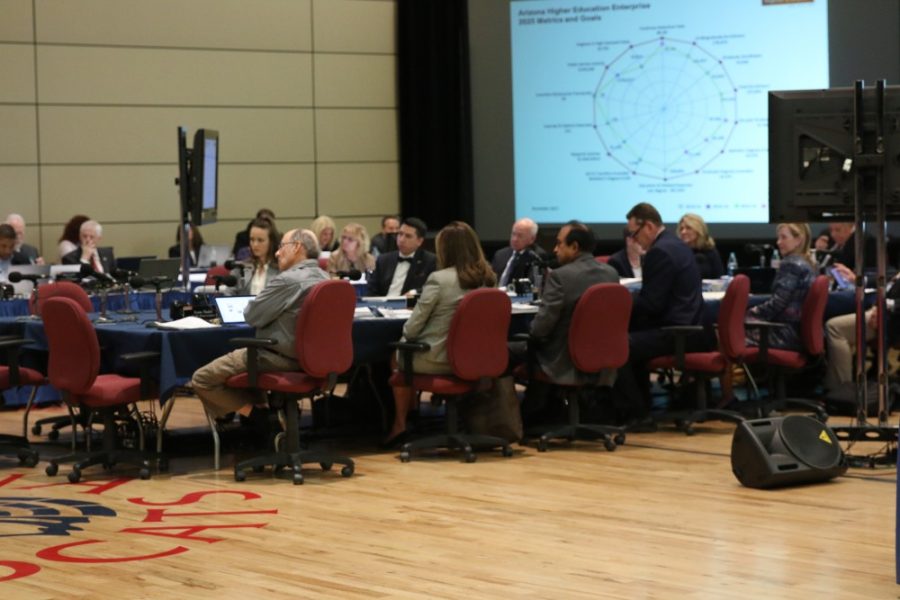With the midterms over, Arizona will seat a new State Legislature in January.
With that in mind, the Arizona Board of Regents, the governing body of Arizona’s three public universities, discussed its new legislative agenda and lobbying positions for the state legislature’s upcoming year during its meeting at the University of Arizona Nov. 15.
“I think we have made some remarkable progress at representing the goals of Arizona’s three public universities over the past three years,” Regent Chair Ron Shoopman said.
During the meeting, the regents’ Legislative Affairs Committee laid out a number of legislative goals for the upcoming year to continue this success, which the board said it hopes will include increased state funding.
Health Insurance Trust Fund
Currently, the faculty of Arizona’s three public universities are a part of Arizona’s health insurance program.
The regents planned to continue to lobby the State Legislature to allow the universities to leave the program.
The fund has been problematic for the universities in the past. Over the last few years, the state withdrew $280 million from the fund to help balance the state budget, according to new Regent Executive Director John Arnold.
RELATED: Regents vote to change tuition-and-fee setting process
Additionally, the universities’ representatives said they believe their healthy employees are subsidizing other state employees and their healthcare costs could be reduced if the regents successfully lobby to allow the universities to withdraw from the fund.
According to Arnold, over the last two years, the UA has paid $15 million in excess premiums to the fund.
Unfunded Mandates
During the last year, the Arizona State Legislature proposed a number of bills that would waive university tuition for some Arizona residents.
The State Legislature revived a program that would provide Arizona Army National Guard members a tuition and fee waiver at the state’s universities. A new program passed by the State House of Representatives would waive tuition and fees at state universities for children who were in Arizona’s foster care system and meet a set of requirements.
While the regents said they support the spirit of these bills, they plan to continue to lobby the State Legislature to provide funding for these tuition waiver mandates, instead of requiring the universities to absorb the over $2 million costs of these bills on top of their $1.5 million current tuition and fee waiver costs.
50/50 Model
“Arizona’s public universities are vital to Arizona’s economic success, growth and the quality of life for Arizona citizens,” the regents’ legislative committee report reads.
The regents plan to develop new, more effective communication plans for the upcoming legislative session that argue increased public funding for universities to the benefit all Arizonans, as stated above.
Currently, the Arizona State Legislature funds about 34.7 percent of tuition for every in-state Arizona student.
The regents planned to lobby the State Legislature to increase this funding to 39 percent next year, with the goal of eventually realizing their 50/50 model, where the state funds 50 percent of in-state Arizona students’ tuition, contrary to the trend of decreasing state support.
“We are one of the few states that does not have financial aid for our students, and we are right at the bottom for per capita student expenditures and state investment in education,” said UA President Dr. Robert Robbins. “We would love to see funding from the state increase.”
Along with more legislative funding, the regents are working on controlling costs and introducing new programs to keep the costs of a college education for Arizona residents affordable and the broader benefits of a higher education accessible.
In that spirit, the regents have said they will lobby against any legislation that reduces university funding or limits their ability to innovate.
Non-lethal Weapons on Campuses
During the last legislative session, the regents helped lobby successfully to defeat a bill that would have prevented the state universities, including UA, from banning weapons that had a low probability of causing death or permanent injury on campus.
The regents planned to address the concerns which inspired the bill, mainly concerns of sexual violence and safety on campus, by requiring university presidents and police chiefs to reevaluate their bans on pepper spray and other non-lethal weapons and publish a new list of approved items for each individual campus based on its needs.
RELATED: Regents approve coach’s contract, purchase Robbins’ house
The board have also said it will oppose legislation that tries to limit its authority in setting tuition and fees, approving developing projects or controlling its financial assets.
“I think it is really important as we enter this new legislative session in a way that shows our values and shows the great capabilities that exist in our great institutions,” Shoopman said.
As new bills are introduced by the State Legislature next year, the regents will meet to discuss their positions and update their lobbying positions.
Follow Randall Eck on Twitter









